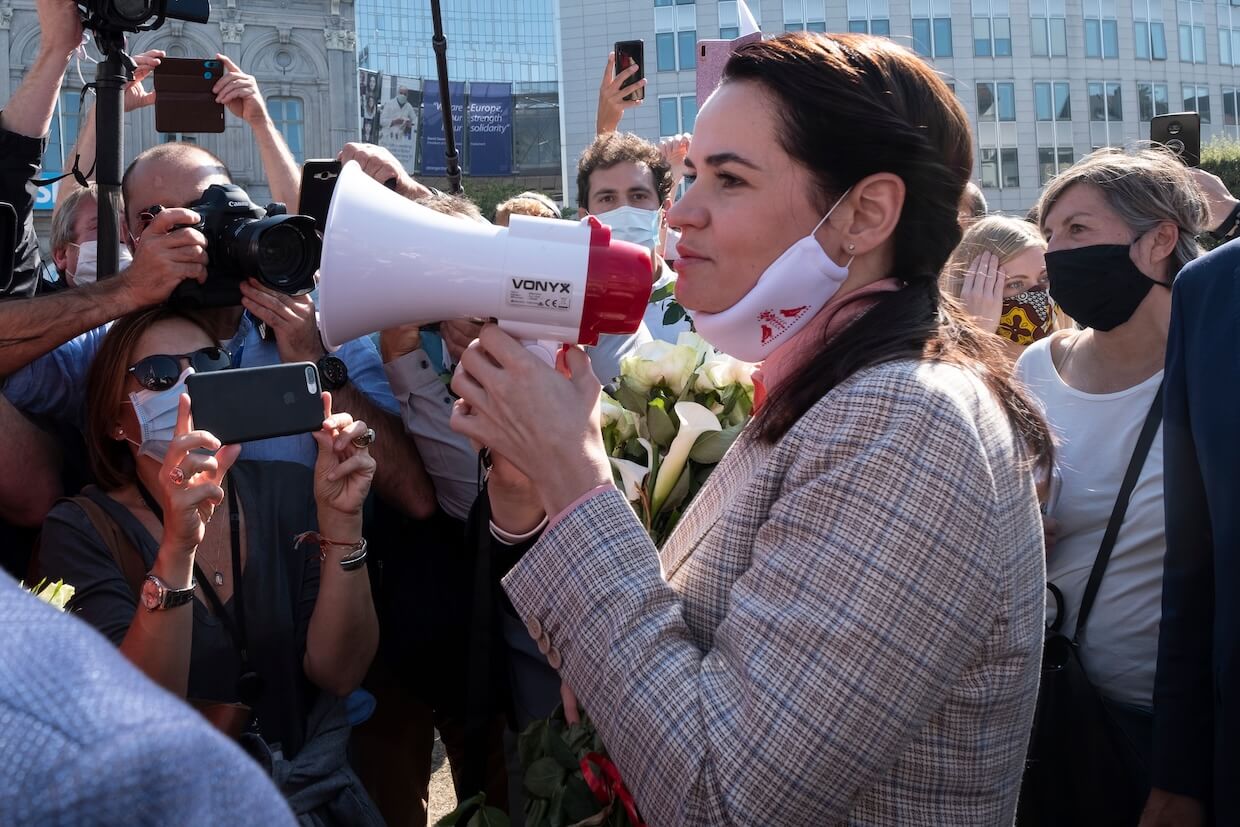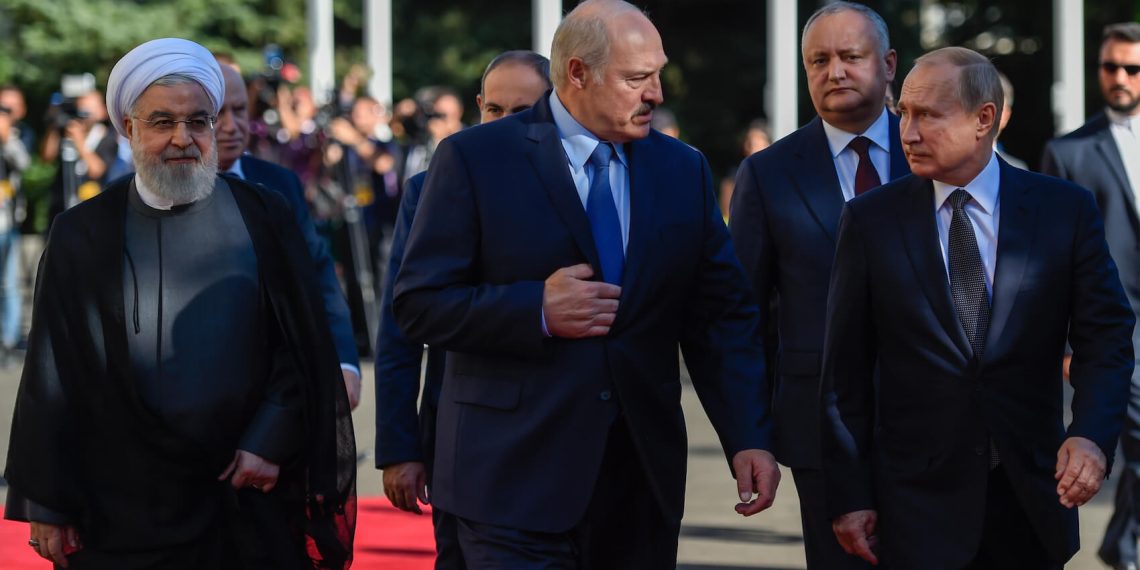In an exclusive interview with the ECPS, Dr. Victoria Leukavets highlights the critical role of sanctions in pressuring Lukashenko’s authoritarian regime. She argues, “Sanctions do work, though some have a delayed effect—particularly economic and sectoral sanctions. However, they do have an impact.” Dr. Leukavets also discusses Russia’s deepening control over Belarus, media repression, and the resilience of Belarusian democratic forces in exile. She underscores that continued Western support for independent media and civil society is essential to counter Lukashenko’s grip on power and prevent Belarus from becoming a full extension of Russia’s influence.
Interview by Selcuk Gultasli
In a candid and insightful interview with the European Center for Populism Studies (ECPS), Dr. Victoria Leukavets, a Research Fellow at the Stockholm Center for Eastern European Studies (SCEEUS), discusses the evolving political landscape in Belarus, Aleksander Lukashenko’s populist strategies, Russia’s growing influence, and the role of the West in countering authoritarian consolidation. Dr. Leukavets emphasizes that the continuation of Western sanctions is essential in exerting pressure on the Lukashenko regime, stating, “Sanctions do work, though some have a delayed effect—particularly economic and sectoral sanctions targeting strategic sectors of the Belarusian economy. However, they do have an impact.”
According to Dr. Leukavets, recent waves of political prisoner releases signal that sanctions are forcing Lukashenko to test the waters for negotiations with the West. “Many would agree that sanctions’ pressure has played a key role in forcing him into this scenario, making him test the waters for negotiations. His primary goal remains easing sanctions’ pressure.” However, she warns that Lukashenko remains committed to tightening his grip on power and that sanctions must continue to be a key instrument in the EU’s foreign policy toolbox.
Throughout the interview, Dr. Leukavets provides a historical overview of Lukashenko’s use of populist rhetoric to maintain control over Belarus, tracing it back to his first electoral campaign in 1994, when he positioned himself as a "man of the people" and an anti-corruption crusader. She explains that Lukashenko’s authoritarian populism has evolved over time, particularly after the 2020 protests, with an intensified level of repression and a media crackdown that has silenced independent voices.
Moreover, Russia’s role in propping up Lukashenko has deepened, making Belarus increasingly dependent on Moscow’s economic, military, and cultural influence. “Frankly speaking, what we are witnessing is the gradual transformation of Belarus into an extension of Russia’s military, economic, and cultural space.”
Dr. Leukavets also discusses the complex relationship between Lukashenko and far-right parties in Europe, the potential U.S. stance under Donald Trump’s presidency, and the strategies Belarusian democratic forces are employing to challenge the regime. She underscores that support for independent media, civil society, and opposition groups in exile remains crucial in resisting Lukashenko’s authoritarian consolidation.
In this interview, Dr. Leukavets offers a compelling analysis of Belarus’s future, outlining what the West can do to counter Lukashenko’s grip on power while avoiding further repression.

Here is the transcription of the interview with Dr. Victoria Leukavets with some edits.
Media as a Key Tool for Lukashenko’s Grip on Power
Dr. Leukavets, thank you very much for joining our interview series. Let me start right away with the first question: How has Aleksander Lukashenko used populist rhetoric to maintain his grip on power in Belarus? In what ways does his approach differ from or resemble other authoritarian populist leaders?
Dr. Victoria Leukavets: Thank you very much for inviting me to do this interview. I think you have raised a very important question. Alexander Lukashenko has indeed used populist rhetoric to maintain his power, and he started using it in the early 1990s. During his first electoral campaign in 1994, he built his campaign on strong anti-corruption narratives. Before running for president, he was the head of the Anti-Corruption Committee in the Supreme Council of Belarus. At that time, he began constructing an image of himself as a man of the people—someone who was very close to the Belarusian electorate and could be seen as a defender of the nation. He positioned himself as a new voice, a fresh figure in the Belarusian political spectrum, and someone capable of cleaning up the system by removing bureaucrats.
His main opponent in the election was Vyacheslav Kebich, who was the Prime Minister of Belarus. Lukashenko’s populist rhetoric at the time proved very successful, as many Belarusians believed in him. In fact, the 1994 elections are considered the only free and fair elections in the history of independent Belarus. As a result, Lukashenko managed to win and secure the presidency.
He has continued to use populist rhetoric throughout his rule up until today. One of his favorite strategies to maintain control over the elites in Belarus and co-opt them has been the use of selective purges. Whenever members of his inner circle showed signs of criticism or disagreement with his political course, he would initiate a public purge, accusing them of corruption or tax evasion. He would present himself as the one capable of identifying and imprisoning these individuals, portraying himself as a fighter who protects the nation from such "parasites." Thus, Lukashenko has consistently used populist rhetoric as an instrument to maintain and solidify his control over Belarus.
How has Lukashenko’s state-controlled media shaped public perception of his rule? To what extent does propaganda fuel populist narratives and suppress opposition voices in Belarus?
Dr. Victoria Leukavets: Media is very important for Lukashenko to maintain his power. Starting from the early 1990s, as soon as he was elected President in 1994, he began consolidating his power, first and foremost, by taking control of the media space. Throughout his subsequent presidencies, we can observe that he gradually tightened control over the media space.
After 2020, what we witness now is that almost all independent media outlets have been labeled as extremist. Most journalists from these independent outlets are either behind bars, imprisoned, or operating from exile. According to the most recent data, around 400 representatives of independent mass media are currently working from abroad. Lukashenko has effectively managed to take full control of the media space, which has been particularly crucial for him, especially before his most recent presidential campaign and the elections, which took place on January 26.
Lukashenko’s Escalating Repression to Prevent Another 2020 Uprising

Do you see Lukashenko’s rule as primarily authoritarian, or does it still retain elements of populist appeal? How has his rhetoric and governance style evolved over time, especially after the 2020 protests?
Dr. Victoria Leukavets: First of all, I would say that one does not contradict the other. Many authoritarian states have a populist appeal, and in fact, populism is used—as we have already discussed—as a tool to maintain a connection with a loyal segment of society and the broader electorate.
If we look at the evolution of the regime in Belarus from the early 1990s until now, 2020 can clearly be considered a watershed moment. Before 2020, Lukashenko resorted to repression, but after 2020, the extent, level, and scale of these repressions have significantly increased. There are now over a thousand political prisoners in Belarus. Lukashenko also engages in trans-border repression, targeting civil society and independent media. As I have already mentioned, he silences anyone who dares to criticize him.
The recent presidential elections were also held in a highly repressive environment. Most of the leaders of the 2020 protests and key opposition figures were imprisoned, and they remain behind bars. Some managed to flee abroad and continue their activities from exile, but they lack strong links to influence the situation in Belarus effectively.
Once again, the level of repression in Belarus is now extremely high. Lukashenko is doing everything he can to tighten his grip on power to prevent a repeat of the 2020 scenario, when his rule was challenged by an unprecedented wave of popular protests.
Belarus Transformed into an Extension of Russia’s Military, Economic, and Cultural Sphere
How does Russia’s influence impact Belarus’s political landscape? To what extent does Lukashenko balance populist nationalism with growing economic and security dependence on Moscow?
Dr. Victoria Leukavets: That’s a very important question. In fact, the Russia factor is a crucial variable in the equation. When we discuss Belarus-Russia relations, Russia’s influence plays a significant role in shaping the Belarusian political landscape. Since the early 1990s, Russia has been trying to increase its influence and control over Belarus in various spheres—political, economic, military, and cultural.
Lukashenko was able to resist this influence with relative success before 2020. However, after 2020, when he was challenged by popular resistance, he turned to the Kremlin for support. Moscow was the one that helped him stay afloat. Since then, Russia’s influence has increased tremendously across all the spheres I identified. It has grown in the economic and political realms but, most importantly, in the military domain.
Belarus and Russia are now effectively building a common defense space. They recently signed a package of agreements, including the security concept of Belarus, which unifies the military policies and armies of both countries even further. Russian influence is also growing in the cultural space, and developments in this area are truly concerning.
One of the most recent developments I would like to highlight is the decision to establish a so-called media conglomerate that would unify the media spaces of Russia and Belarus. This entity would broadcast news in Russian across Belarusian territory, further strengthening Russia’s hold over Belarusian cultural discourse. Additionally, both Belarus and Russia are actively rewriting history books. More subjects in Belarusian schools and universities are now being taught in Russian.
Frankly speaking, what we are witnessing is the gradual transformation of Belarus into an extension of Russia’s military, economic, and cultural space.
As Europe’s longest-serving leader, Lukashenko cruised to his seventh election victory in a row in a contest that his exiled opponents dismissed as a sham. EU called the elections ‘neither free nor fair.’ How would you characterize the elections as an academician?
Dr. Victoria Leukavets: Indeed, these elections were not democratic. For any election to be recognized as democratic, they must adhere to certain international standards, and these elections failed to meet those standards at every phase of the electoral process. I would like to remind our audience that when we talk about elections, it is not only election day (E-day) that should be analyzed but the entire electoral process, starting from the beginning of the electoral campaign.
Once again, I would like to emphasize that the Lukashenko regime violated international standards for free and fair elections during every phase—the electoral campaign, election day, and the post-electoral phase.
If we look at the most common violations, I would highlight three major points. First, the highly repressive environment, which I have already mentioned, and the tightly controlled media space allowed Lukashenko to manipulate the narrative and deprived Belarusian citizens of alternative sources of information.
Second, the candidate registration process was highly flawed. Although four other candidates ran in the election alongside Lukashenko, they could not be considered real opponents or challengers. They were merely spoiler candidates whose main goal was to create the illusion of political competition.
Third, independent electoral observation was severely restricted. The OSCE/ODIHR mission, for example, was not invited to participate in the elections in time. The Belarusian regime did send an invitation, but it was too late—only about 10 days before the election. This was far too late for international observation missions from organizations such as the OSCE, the Council of Europe’s Parliamentary Assembly, or the EU, whose role is to monitor the entire electoral process, beginning with the campaign period. These organizations typically begin their observation at least a month before election day. The lack of independent electoral observation further compromised the integrity of the election results and simply helped Lukashenko accomplish his mission—to "win" the elections with an inflated vote count that does not reflect his actual support among the Belarusian population.
European Far-right Parties and the Lukashenko Regime Share Certain Synergies

Far-right parties in Europe like Alternative for Germany (AfD), hailed the vote as a victory for democracy and denounced criticism of the election by European officials and the European Parliament. How would you explain the dynamics of relationship between Lukashenko and European far-right parties?
Dr. Victoria Leukavets: It’s an interesting relationship. Far-right parties and the Lukashenko regime share certain synergies, particularly in their opposition to Western liberal values and Western influence. This is where their interests converge. For instance, Germany sent some electoral observers representing these problematic far-right parties to observe the previous parliamentary elections in Belarus, which took place last year. All of them praised how well the elections were organized.
Lukashenko’s connection with these right-wing parties essentially helps him offset Western criticism and send a signal that his regime, his values, and his positions are supported by certain forces in Europe. He tries to present these forces as growing in popularity, claiming they represent a significant segment of the European public. This, in turn, helps him promote the narrative that there is currently a global demand for authoritarian regimes and dictatorships—as he explicitly calls them. In precisely this way, he argues that the world is increasingly seeking out dictatorial governance.
It is known that the newly elected US president Donald Trump is sympathetic to far-right parties and populist parties in Europe. Elon Musk, who is now responsible for government efficiency in the US has already declared his support for German far-right Alternative for Germany (AfD). How do you think the relationship between US and Lukashenko will evolve during Trump’s presidency?
Dr. Victoria Leukavets: That’s an important question—one that many Belarusian analysts and representatives of Belarusian democratic forces are trying to answer. We need to understand that we are all in the realm of speculation here, as Trump is known for his unpredictability. That being said, most analysts agree that we will not witness any drastic shifts in US policy toward the Lukashenko regime or the Belarusian democratic movement. For instance, it is unlikely that we will see an easing of sanctions or a reduction in pressure against the Lukashenko regime. The new US administration will likely continue criticizing Lukashenko for human rights violations and repression while maintaining or even imposing new restrictive measures against him.
It is also highly unlikely that we will see any high-level visits from US officials to meet with Lukashenko. Let me remind that during the previous Trump administration, several US representatives visited Belarus. For instance, Mike Pompeo and John Bolton traveled to Minsk, where they met with Lukashenko and discussed various critical issues, including energy supply. In fact, Belarus even began purchasing some energy from the US to offset its dependence on Russia. We will not witness anything of this sort during the new presidency. Instead, US policy will likely continue along the lines established by the Biden administration.
The nature of relations may, however, become more transactional. It is not out of the question that the US administration might signal an openness to negotiations, but any such negotiations would come with very strict conditions. Any offer from international partners, including the US, to the Lukashenko regime would be accompanied by firm preconditions.
As for Belarusian democratic forces, they remain hopeful. They hope that the US will continue supporting them and maintaining the strategic dialogue with the Belarusian democratic movement, which was launched during the Biden presidency. They also hope to send a message that Belarus remains highly relevant to US interests—primarily because Belarus serves as a gateway for China’s growing influence in Europe. Given the US’s strong interest in curbing Chinese influence, they may recognize the importance of supporting the Belarusian democratic movement.
Belarus Under Lukashenko Is Sliding Into a Totalitarian Regime
Given the repression of the Belarusian opposition, what strategies have emerged to challenge Lukashenko’s rule? Is there potential for a new populist movement from the opposition, or is Belarus heading toward deeper authoritarian consolidation?
Dr. Victoria Leukavets: Belarus is definitely under the Lukashenko regime, and it is sliding further into a totalitarian state. However, Belarusian democratic forces have developed very efficient methods, and they are doing their best to challenge the Lukashenko regime.
One of these methods is active advocacy on the international stage. Over the past five years, since Sviatlana Tsikhanouskaya was forced into exile, they have been actively building contacts with numerous international actors and institutionalizing relations with various organizations. For example, the Council of Europe (CoE) has already established a working group on Belarus that raises issues such as human rights violations and ongoing repression in the country. A similar group was established within the OSCE Parliamentary Assembly. The European Parliament also signed an agreement for cooperation with the Belarusian Parliament in Exile, the Coordination Council.
In general, this parliamentary dimension of cooperation is very strong and continues to grow. The Belarusian democratic forces have created an international parliamentary alliance in support of Belarus, which includes over 20 countries, both EU and non-EU. In the parliaments of these countries, there are groups of friends for democratic Belarus that serve as vehicles for keeping Belarus on the international agenda, raising awareness, and attracting global attention to the country’s problems.
Democratic forces also prioritize the issue of political prisoners—not only their release but also their rehabilitation. Thanks to their efforts, they established the International Humanitarian Fund to support political prisoners. Several countries have already contributed substantial amounts of money to this fund to assist those who have suffered from the harsh repressions of the Lukashenko regime.
Overall, I would characterize the Belarusian democratic movement as relatively united. Yes, of course, there are certain conflicts within the movement—this is inevitable and part of a healthy process. However, on a comparative scale, if we look at other opposition movements in exile, such as the Russian opposition, we can see that the level of internal cohesion and coherence within the Belarusian democratic movement is very high. This unity is one of the key markers of its success.
Belarusian Democrats in Exile Represent the Future of a Free and Democratic Belarus

You highlight the Kremlin’s role in sustaining Lukashenko’s regime. What specific steps should the EU take to counter Russia’s leverage in Belarus and support a democratic transition without provoking further repression?
Dr. Victoria Leukavets: It’s a very difficult question. It’s a tough balancing act, and, in fact, counterbalancing Russia’s influence in Belarus might not be entirely feasible under the current circumstances. One way to do so is by supporting free and independent Belarusian media, as media serves as a powerful instrument for providing unbiased information to the Belarusian people and combating propaganda from both the Russian and Lukashenko regimes.
Of course, the West should continue its sanctions. Sanctions do work, though some have a delayed effect—particularly economic and sectoral sanctions targeting strategic sectors of the Belarusian economy. However, they do have an impact. Some analysts argue that, thanks to sanctions pressure, Lukashenko is now seeking ways to open negotiations with the West.
A recent development worth mentioning is that he has been releasing political prisoners in Belarus since July last year. There have been several waves of prisoner releases, leading many to speculate on Lukashenko’s motivations. Many would agree that sanctions pressure has played a key role in forcing him into this scenario, making him test the waters for negotiations with the West. His primary goal remains easing sanctions’ pressure.
So once again, sanctions do work—they are one of the most effective tools in the EU’s foreign policy toolbox, and the EU should continue using them.
Lastly, another critical instrument the EU can use to help democratic Belarus is to support Belarusian democratic forces and civil society, particularly those in exile. These individuals are agents of change and key stakeholders who can exert real pressure on the Lukashenko regime. They represent the future of a free and democratic Belarus.


